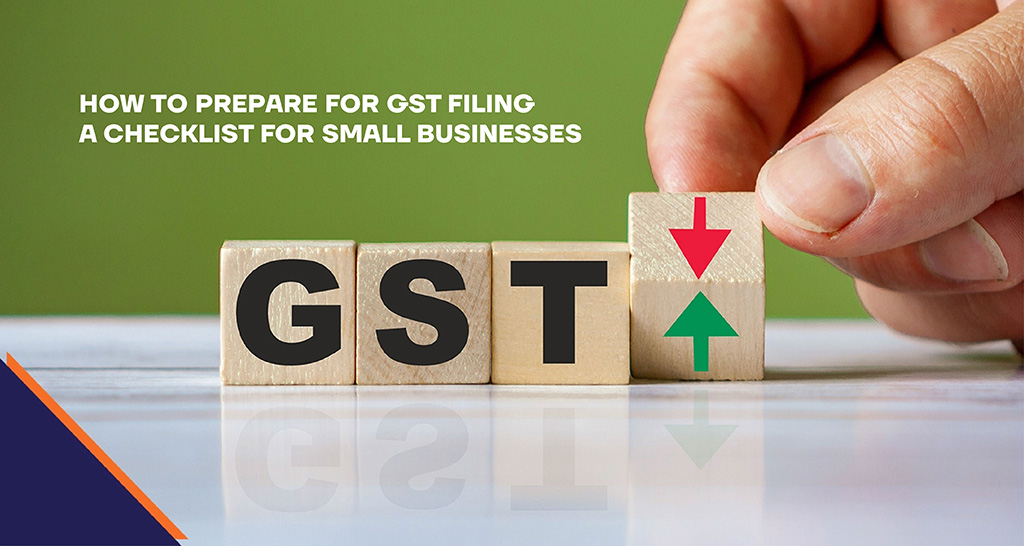The Goods and Services Tax (GST) represents an extensive indirect tax framework in India, designed to simplify the taxation process and enhance the ease of conducting business. Small enterprises need to grasp and adhere to GST regulations. Although the complexities of these regulations may be daunting, particularly for entrepreneurs lacking tax expertise, proactive preparation for GST filing is vital for maintaining compliance and preventing unwarranted penalties.
A comprehensive checklist is provided to assist small businesses in navigating the GST filing process, ensuring that they fulfill all necessary requirements punctually.
- Ensure GST Registration is in Place
It is essential to confirm that your business is adequately registered under GST before considering the submission of GST returns.
Businesses with an annual turnover surpassing ₹40 lakh are mandated to register for GST. Nevertheless, businesses with a lower turnover have the option to register voluntarily.
GSTIN: Upon registration, your business will be assigned a distinct GST Identification Number (GSTIN), which is necessary for the submission of returns. If your business is already registered, please verify the accuracy of the GSTIN.
- Understand the Different GST Returns
Various categories of GST returns must be submitted, contingent upon the nature of your business and the type of supplies you provide. Small businesses need to determine which return forms are relevant to their operations.
GSTR-1: For reporting outward supplies (sales).
GSTR-3B: A summary return for monthly or quarterly payment of GST.
GSTR-4: For composition scheme taxpayers (for businesses with turnover up to ₹1.5 crore).
GSTR-9: The annual return form for GST compliance.
GSTR-9C: For a reconciliation of annual returns and audit.
Ensure that you are aware of the filing frequency required for each type of return, whether it is monthly, quarterly, or annually, based on your business’s turnover and the nature of the supplies provided.
- Keep Your Books of Accounts in Order
Accurate bookkeeping is crucial for filing Goods and Services Tax (GST) returns. Your financial documentation will assist in reporting sales, purchases, and taxes paid, all of which are necessary for the submission of returns.
It is essential to keep accurate documentation of all transactions, encompassing invoices, supply bills, receipts, and any other pertinent records.
It is advisable to maintain distinct records for sales and purchases. This practice will enable you to accurately assess the input tax credit (ITC) on your purchases as well as the GST obligations arising from your sales.
It is essential to monitor all transactions related to GST, including taxes incurred on purchases, taxes collected from sales, and the total amount of input tax credit eligible for claim.
- Reconcile Sales and Purchases
Reconciliation plays a crucial role in the preparation for GST filing. It is essential to ensure that the sales and purchases data are reconciled prior to submitting your returns.
It is crucial to ensure that the sales figures presented in GSTR-1 correspond with those in GSTR-3B. Discrepancies between these two returns could lead to penalties or additional tax liabilities.
Ensure that all purchases are accurately documented and aligned with the supplier’s GSTR-1 to properly claim the appropriate input tax credit.
Reverse charges: It is essential to ensure that any GST liability under reverse charge is accurately recorded in your business’s financial documentation.
- Verify and Claim Input Tax Credit (ITC)
One of the key benefits of the Goods and Services Tax (GST) is the Input Tax Credit (ITC), which enables businesses to receive a credit for the tax incurred on their inputs (purchases) in relation to the tax collected on their outputs (sales). To accurately claim the ITC, adhere to the following steps:
Ensure eligible invoices: Only those purchase invoices that satisfy the GST criteria are eligible for claiming ITC.
Ensure that the tax credit you claim for purchases is correctly documented in your sales records.
Reconcile with supplier’s returns: Ensure that your suppliers have submitted their GST returns (GSTR-1) and verify that the input tax credit is accurately reflected in your GSTR-2A.
Adjust for ineligible ITC: Omit acquisitions that do not qualify for ITC, including motor vehicles or items/services utilized for personal use.
- Know the Deadlines and Penalties for Late Filing
GST returns must be submitted by designated deadlines to prevent incurring penalties. The deadline for filing GST returns is determined by the nature of the return and the revenue generated by your business.
Monthly Returns: GSTR-1 must be submitted by the 11th of each month, while GSTR-3B is due by the 20th of the subsequent month.
Quarterly Returns: For small enterprises operating under the composition scheme, the submission of GSTR-4 is required quarterly.
Annual Returns: GSTR-9 must be submitted by December 31st of the subsequent financial year.
Timely submission of tax returns is essential, as failing to do so may result in incurring late fees and penalties. Furthermore, postponing the filing process can adversely impact your claims for input tax credits.
Tax professionals: For complex situations, it is advisable to consult a chartered accountant (CA) or a GST consultant to guarantee adherence to regulations and prevent mistakes.
- Review and File GST Returns
Once all relevant information has been collected and verified, the next step is to submit your returns. This process is conducted online, allowing you to file your returns directly through the GST portal.
Review your returns: Prior to final submission, examine your GST returns to confirm their accuracy.
Submit and pay tax: Upon completion of your review, please submit your returns and remit any applicable GST owed.
Conclusion
For small businesses, the process of preparing for GST filing may appear overwhelming; however, by following the appropriate preparation steps and adhering to the aforementioned checklist, you can facilitate a seamless and compliant experience. Maintaining accurate documentation, filing on time, and comprehending the requirements will not only assist in evading penalties but also enhance your tax credits. By remaining organized and monitoring your financial transactions, you can effectively manage your GST responsibilities and concentrate on expanding your business.






